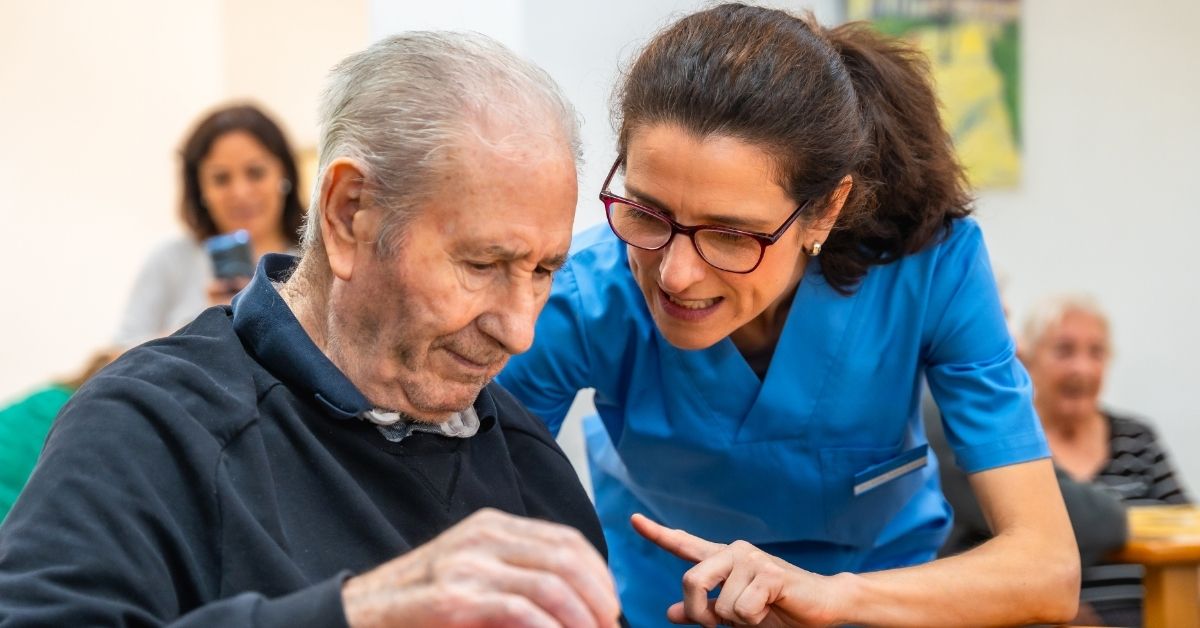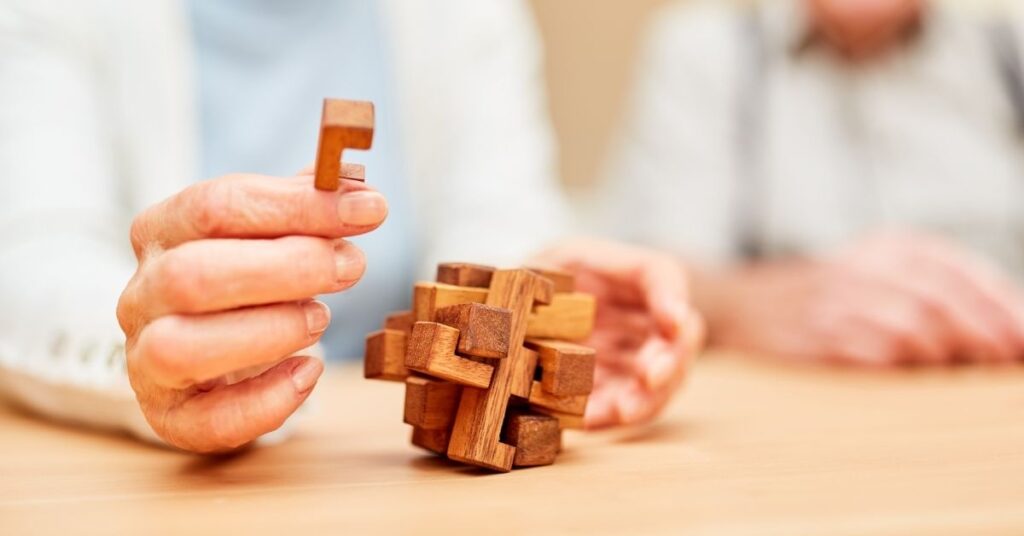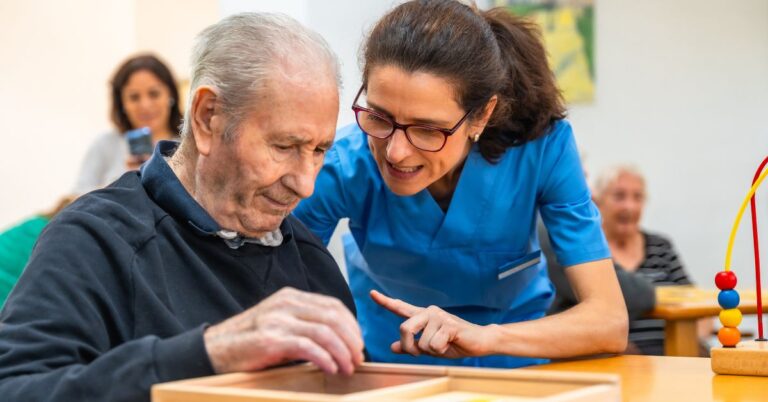Monday to Saturday - 8:00 -17:30
Beyond Basic Memory Care for Your Loved One

Most families find themselves searching for exceptional memory care in Richmond, MI, during their most vulnerable moments. The moment you realize care is needed often follows a fall, a surprise hospital visit or a difficult mental health crisis. You’re not alone in this experience; there’s no shame in reaching this point. What matters most is understanding that the best outcomes happen when families can plan rather than react to emergencies.
Your loved one deserves more than just basic supervision. Specialized memory care programs create genuine opportunities for growth, connection and joy for people living with Alzheimer’s, dementia and other cognitive challenges.
Memory care activities aren’t just ways to pass the time—they’re created to help your loved one feel engaged and fulfilled, not just to get through the day.
Creative Cognitive Enrichment in Memory Care
Quality memory care communities go beyond basic activities to offer creative programs that truly engage your loved one’s mind and spirit. These thoughtful approaches help residents stay connected to their capabilities, even as memory challenges grow more complex.
Brain games and puzzles for stimulation
Mental challenges can make a real difference in keeping the mind sharp, especially for those with mild cognitive impairment. Activities like crossword puzzles can help build connections in the brain that may delay memory loss. These brain games are also great for thinking and emotional control, while card games strengthen memory, communication and reasoning skills.

Storytelling sessions
Sharing stories gives residents a chance to connect with others through their experiences. Even when dementia progresses significantly, people often maintain the ability to tell coherent personal stories.
Tactile and sensory activities
Simple, everyday items can be powerful ways to engage the senses and create positive feelings. Things like textured materials and scent boxes offer comfort that helps residents feel present and focused on the moment.
Crafts and painting for fine motor skills
Creative projects bring multiple rewards: a sense of accomplishment, improved motor skills and mental stimulation. Watercolor painting is a great way to feel calm and improve concentration.
Music and art therapy for emotional connection
Music therapy delivers remarkable cognitive and emotional benefits for memory care residents. Even with advanced dementia, a person might still tap their foot to a familiar rhythm or sing along to songs from their youth. These moments create a precious connection when words become hard to find.
Physical and Social Activities to Stimulate Your Mind
Quality memory care extends well beyond therapeutic sessions. Physical and social activities are woven daily at memory care communities in Richmond, MI, creating natural options for your loved one to stay engaged while building connections with others.
Group fitness and movement classes
Your body and mind work together, especially when dealing with dementia. Regular physical activity brings tangible benefits—lower blood pressure, relief from anxiety and depression and reduced stress that often accompany cognitive changes.
Gardening and cooking clubs
When residents get their hands in soil or help prepare a meal, something magical happens. Gardening awakens the senses, often improving appetite and assisting people in sleeping more soundly. Watching seedlings grow under their care brings a deep sense of accomplishment that words can’t capture.
Cooking clubs tap into powerful sensory memories while bringing people together. These activities often unlock vivid recollections for seniors with Alzheimer’s or dementia. Simple projects—arranging fruit on skewers or adding toppings to personal pizzas—create moments of genuine laughter and shared joy.
Holiday celebrationsthemed events
Familiar traditions can provide a lot of comfort when things feel uncertain. Memory care staff understand this and involve residents in holiday preparations through simple activities like arranging decorations or setting the table. These rituals provide a sense of stability and a connection to cherished memories.
Adjust Programs as Cognitive Needs Change
Your search for quality memory care in Richmond, MI, doesn’t have to feel overwhelming. The difference lies in understanding what truly matters.
Quality memory care providers focus on:
- Therapeutic programs like music or art therapy that keep emotional bonds strong
- Physical activities adapted to each person’s abilities that support both body and mind
- Creative experiences through puzzles, stories or sensory activities that engage the whole person
Your role as a family doesn’t end when professional care begins. The stories you share, the traditions you remember and the personal details you provide become the foundation for activities that reflect who your loved one truly is. This partnership makes all the difference in creating meaningful days.
The right memory care setting can bring unexpected moments of happiness to your loved one’s life. They deserve care that sees their whole story, honors their abilities and finds ways to help them shine despite their challenges. Get to know us, schedule a tour by calling (586) 473-8289 and learn about our Aion Care communities where your family member will receive the personalized attention they deserve.
FAQs
Q1. How can physical activity help someone in memory care?
Physical activity is very beneficial for people in memory care. Group exercise classes, gardening or even cooking clubs can help lower blood pressure, ease symptoms of anxiety or depression and reduce stress. Staying physically active may also help with cognition. These activities also encourage socializing and keep the senses engaged, boosting overall well-being.
Q2. What kinds of creative activities help with cognitive stimulation in memory care?
There are many creative ways to support cognitive health in memory care settings. Residents often enjoy puzzles, brain games, storytelling, arts and crafts, painting, sensory activities and even interactive music sessions. These kinds of activities don’t just help keep the mind active—they also provide emotional expression and help residents stay connected to themselves and others, even with memory challenges.



